In an ideal world, you would divorce your partner without any debt. However, that is rarely the reality. Most of us carry some sort of debt. Many of us have thousands of dollars in debt.
It is easy to rack up debt. Many of us have been unemployed at some point and a lack of income makes it hard to pay bills and buy necessities. We then use our credit cards and this causes the debt to pile up. An injury or health issue can cause substantial medical bills. Many college graduates have student loan debt.
On top of everything, the coronavirus pandemic has caused economic uncertainty across the country. Millions of people have lost their jobs and the government has done very little to help struggling Americans.
Understand Your Debt
If you are considering divorce and have debt, the first thing you want to do is understand your debt. Some debts are fixed, like mortgages, while others are flexible, like credit cards. Some debts have low interest rates, while others are higher. It is important to get the interest rates and balances of each debt so you can decide which ones to pay off sooner.
If your spouse has debt, you may be responsible for it if you live in a community property. Florida is an equitable distribution state, so it is likely that you will not have to pay the debt if it is not in your name.
It is easy when the debt is in your name only because that means that you will be responsible for paying it off. But when the debt is in both your name and your spouse’s name, things get more complicated. Who will pay the balance? Should you split it?
For joint accounts, you are both responsible for making the monthly payments. This means that even if your ex-spouse agrees to pay the bill, if he or she fails to do so, your credit will be impacted. Therefore, you should both be on the same page as to who will pay which bills. Keep in mind that a divorce decree does not change who is responsible for payment. The lender can still contact you for payment.
This means that you may have to pay to protect your credit score. The only thing you can do in this situation is to have an indemnity clause added to your divorce settlement agreement. This clause will allow you to seek repayment from your ex-spouse for any money you had to pay toward the loan to keep it from going into default. Ask your lawyer about this if you have any concerns.
Refinancing
If you do not want to be responsible for a home or auto payment, you may try to get your name removed from the title. This is not a good idea if there is an outstanding loan.
Instead, insist that the property be refinanced in your spouse’s name alone. If your ex-spouse is keeping the marital home, your ex will need to refinance the loan so that it is in his or her name only. This will remove your name from the loan and from any further financial responsibility.
Your divorce decree should outline the terms of the refinance. It should give your ex-spouse a certain time limit to complete the refinance and include some consequence if he or she fails to do so. An example would be putting the home on the market for sale.
Pay Off Debt
Because of the complications involved, it is a good idea to pay off as much debt as possible. But what happens when the account is paid off? Should you close it or keep it open? Traditional knowledge says to close the account to prevent your ex-spouse from running up new charges. However, if it is an old account, closing it could hurt your credit. You may have used that account to establish your good credit history. Discuss with your ex-spouse what a good solution would be. It may be better to keep the account open and ensure your ex-spouse does not have access to it.
To pay off debt, you and your ex-spouse may agree to sell assets. While you should do what you can to pay down debt, do not use investments or retirement accounts to do so. This money can help you in the future. If you do sell assets, make sure they are unwanted items with no sentimental value.
Seek Legal Help
Divorce is complex enough. Having to deal with excessive debt as well can complicate the process even more. It is a good idea to understand your options when it comes to reducing your debt obligations.
Get the help you need from Broward County divorce attorney Scott J. Stadler. He can guide you through the divorce process and assist with asset and debt division. Call our office today to get started. Call (954) 346-6464 or fill out the online form.

